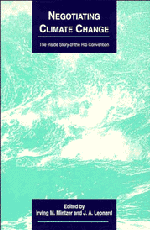Book contents
- Frontmatter
- Contents
- Acknowledgements
- Commonly Used Acronyms
- Foreword
- Part I Background
- Part II Views from Within the Ring
- 3 Exercising Common but Differentiated Responsibility
- 4 The Beginnings of an International Climate Law
- 5 Constructive Damage to the Status Quo
- 6 The Climate Change Negotiations
- 7 A Personal Assessment
- 8 The Road to Rio
- 9 A Failure of Presidential Leadership
- 10 Looking Back to See Forward
- Part III The Outside Edges In
- Part IV Prospects for the Future
- Appendix: The Framework Convention on Climate Change
- Index
5 - Constructive Damage to the Status Quo
Published online by Cambridge University Press: 01 June 2011
- Frontmatter
- Contents
- Acknowledgements
- Commonly Used Acronyms
- Foreword
- Part I Background
- Part II Views from Within the Ring
- 3 Exercising Common but Differentiated Responsibility
- 4 The Beginnings of an International Climate Law
- 5 Constructive Damage to the Status Quo
- 6 The Climate Change Negotiations
- 7 A Personal Assessment
- 8 The Road to Rio
- 9 A Failure of Presidential Leadership
- 10 Looking Back to See Forward
- Part III The Outside Edges In
- Part IV Prospects for the Future
- Appendix: The Framework Convention on Climate Change
- Index
Summary
The Framework Convention on Climate Change probably qualifies as the first global “sustainable development convention.” It integrates the basic human quests for economic security and for a safe and healthy environment. In this chapter we hope to do four things. First, we want to review how the nature of the climate change problem, and of its solutions, influenced the negotiations and resulted in a “sustainable development convention.” Second, the chapter will discuss how the process evolved over time—from science to negotiations to agreement—and attempt to draw some lessons from this experience. Third, we will review why we think the Convention's mechanisms and processes are significant. Fourth, and finally, we would like to highlight the importance of a “prompt start” to follow-up on the negotiations. We emphasize that the views expressed here are our personal views and are not to be considered as the positions of either the United Nations Environment Programme or the Government of Canada.
Climate change is a particularly challenging policy question. It is, first of all, a policy problem of unprecedented scope and complexity. The enhanced greenhouse effect is the unanticipated result of industrialization, land use and technological changes, modern lifestyles and our dependence on energy. In fact, someone has described it as the result of normal, not aberrant, behaviour. There is no particular villain, for we are all responsible.
- Type
- Chapter
- Information
- Negotiating Climate ChangeThe Inside Story of the Rio Convention, pp. 113 - 128Publisher: Cambridge University PressPrint publication year: 1994
- 1
- Cited by



